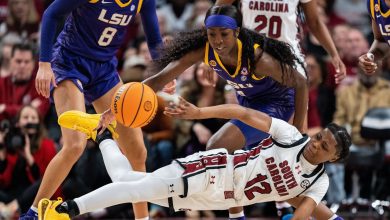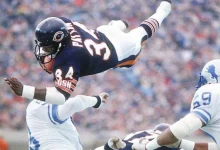Tennessee men’s basketball coach Rick Barnes announced Scott Daughtry’s hiring as the program’s director of strategy, enhancing the team’s tactical planning and game preparation for upcoming seasons.

In a significant move to bolster the University of Tennessee men’s basketball program, head coach Rick Barnes announced on Monday the hiring of Scott Daughtry as the team’s new Director of Strategy. This addition marks a crucial step in Tennessee’s ongoing effort to maintain and elevate its competitive edge in one of college basketball’s toughest conferences, the Southeastern Conference (SEC).
The role of Director of Strategy, while relatively new in college basketball coaching staffs, has grown increasingly vital in today’s game, where analytics, tactical planning, and detailed opponent scouting can make the difference between victory and defeat. With Daughtry joining the Volunteers’ staff, Tennessee is poised to enhance its preparation, in-game adjustments, and overall strategic approach as it competes at the highest level.
The Role of a Director of Strategy in College Basketball
To fully appreciate the significance of Scott Daughtry’s hiring, it’s important to understand the Director of Strategy position and its growing importance in modern basketball.
Traditionally, college basketball coaching staffs were composed mainly of the head coach, assistant coaches, and support personnel such as trainers and video coordinators. However, with the advent of advanced analytics and technology, teams have begun incorporating specialized roles focused solely on strategy and analysis.
The Director of Strategy typically handles:
- Opponent Scouting: Analyzing upcoming opponents’ tendencies, strengths, and weaknesses through video breakdowns and statistical data.
- Game Planning: Assisting the coaching staff in formulating detailed game plans, including offensive sets, defensive schemes, and situational strategies.
- In-Game Adjustments: Monitoring game flow and suggesting tactical changes to respond to the opponent’s strategies.
- Analytics Integration: Leveraging statistical insights and data trends to inform decision-making on everything from player rotations to shot selection.
This position acts as a bridge between raw data and coaching intuition, ensuring that coaches have the most comprehensive, actionable information at their disposal. In a league as competitive as the SEC, such insights can be invaluable.
Scott Daughtry: Background and Experience
Scott Daughtry brings a wealth of experience in basketball strategy, video analysis, and coaching to the Tennessee program. Before joining the Volunteers, Daughtry worked extensively in various coaching and strategy roles, earning a reputation for his analytical acumen and keen understanding of basketball tactics.
Daughtry’s basketball journey includes:
- Video and Scouting Expertise: He has spent years dissecting game film, breaking down opponent tendencies, and preparing detailed scouting reports to assist coaching staffs.
- Coaching Experience: Daughtry has worked alongside coaches at multiple levels, contributing to player development, game preparation, and strategy formulation.
- Analytical Skills: Known for his ability to combine quantitative analysis with basketball knowledge, Daughtry helps translate complex data into understandable, actionable strategies.
His blend of skills makes him an ideal fit for a program like Tennessee, which has embraced a holistic approach to building a winning team—one that combines talent development, physical preparation, and strategic sophistication.
Rick Barnes’ Vision and Why This Hire Matters
Rick Barnes, in his tenure as Tennessee’s head coach, has emphasized building a program that competes at the highest level year after year. Known for his defensive-minded teams and disciplined style of play, Barnes understands the value of strategy in gaining an edge over elite competition.
By bringing in Scott Daughtry as Director of Strategy, Barnes is signaling a commitment to staying ahead of evolving trends in basketball. This hire is not just about adding another coach; it’s about enhancing the program’s infrastructure to compete on all fronts.
Barnes commented on the hire, stating that Daughtry’s expertise will provide the Volunteers with “a new level of tactical preparation” that will complement the coaching staff’s strengths and help the team adapt dynamically during games.
How Daughtry’s Role Will Enhance Tennessee’s Competitiveness
The addition of a dedicated strategist allows Tennessee to focus more deeply on opponent preparation and game-time adjustments—two areas where fine margins often decide outcomes in college basketball.
Here’s how Daughtry’s role is expected to influence the Volunteers’ performance:
- Deeper Opponent Analysis: With Daughtry overseeing scouting, Tennessee can expect more detailed breakdowns of upcoming opponents. This means identifying specific tendencies such as a favorite pick-and-roll option, preferred shooter spots, or defensive weaknesses.
- Tailored Game Plans: No two opponents are the same, especially in the SEC. Daughtry’s analysis will help Tennessee develop customized game plans that exploit mismatches and limit opponents’ strengths.
- Improved In-Game Adjustments: Basketball is a fast-paced sport where coaches must react quickly. Daughtry’s presence during games will provide Barnes with real-time insights, enabling smarter substitutions, defensive switches, and play-calling.
- Integration of Analytics: Advanced statistics—such as shot location efficiency, pace metrics, and lineup effectiveness—will be incorporated into Tennessee’s strategy, ensuring decisions are data-driven rather than purely instinctual.
- Player Development: Though not his primary role, Daughtry’s tactical insights can assist in player education, helping athletes understand game situations better and make smarter decisions on the court.
What This Means for Players and Fans
For Tennessee’s players, the hiring of Scott Daughtry signals a professional environment increasingly aligned with the highest standards in basketball. The team will be equipped with cutting-edge tools and insights, allowing players to prepare better for games and respond effectively to in-game challenges.
From a fan perspective, this move suggests Tennessee is serious about sustaining and improving its status as a powerhouse in college basketball. It shows the program’s investment in behind-the-scenes resources, reflecting a long-term vision of competitiveness and excellence.
Comparisons with Other Programs
Many top-tier college basketball programs have recognized the value of roles like Director of Strategy. Schools like Duke, Kentucky, and Virginia have incorporated similar positions, blending traditional coaching with analytics and video expertise.
Tennessee’s addition of Scott Daughtry follows this trend, putting the Volunteers in elite company. This move aligns with the broader modernization of college basketball programs, where strategic depth can be a critical difference-maker.
Challenges and Expectations
While the benefits of adding a Director of Strategy are clear, the role also comes with expectations and challenges. Daughtry will need to quickly integrate with the coaching staff, understand the team’s culture, and deliver actionable insights that positively impact game outcomes.
The SEC’s competitive nature means every opponent is tough, and Tennessee will need to maximize the value of this new role. Success will depend on how well the coaching staff and players embrace Daughtry’s input and how effectively it translates into improved performance on the court.
Looking Ahead: Tennessee’s Path Forward
With Scott Daughtry on board, Tennessee’s men’s basketball program is well-positioned for continued growth. The combination of Rick Barnes’ coaching acumen and Daughtry’s strategic expertise offers a powerful formula for success.
Fans can look forward to a team that is better prepared, more adaptable, and tactically astute as the Volunteers navigate challenging SEC schedules and NCAA tournament aspirations.
The University of Tennessee’s hiring of Scott Daughtry as Director of Strategy represents a forward-thinking approach to college basketball. By embracing modern analytical techniques and deep strategic planning, the Volunteers are enhancing every facet of their game preparation and execution.
Under Rick Barnes’ leadership, this addition strengthens Tennessee’s quest for sustained excellence and competitive dominance. As Daughtry steps into his role, the program, players, and fans alike have reason to be optimistic about the future of Tennessee basketball.









